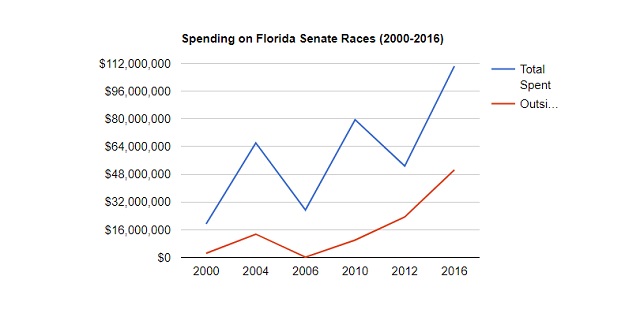Florida Senator Bill Nelson has raised more than $10 million and spent more than $3 million on a 2018 midterm race that may soon go from smooth sailing to a hurricane of political spending.
Nelson, a Democratic incumbent, is running virtually unopposed as he awaits the probable entrance of Florida’s Republican Governor Rick Scott.
The Trump-backed governor has yet to announce his candidacy in the wake of the Parkland shooting, the state’s passing of gun control legislation and a slew of bills moving through the Florida Legislature.
But Scott is expected to make his bid for Senate official on April 9, tweeting Monday morning that he had a “big announcement.”
That announcement will likely bring with it an influx of money, Florida pollster Brad Coker said.
“A lot of big bundlers are Floridians,” Coker said. “The money is already here; the precedent has already been established. All our contested elections have involved huge amounts of money. It’s just a matter of who can spend it the smartest.”

Since 2000, deep pockets have defined Florida Senate elections, and spending reached an all-time high for the state in 2016, Federal Election Commission records show.
Total spending on Florida Senate races has grown from $19.3 million in the 2000 race — Nelson’s first run for the Senate seat — to $110.5 million in 2016. That includes candidate spending and outside spending, such as spending by “dark money” groups and super political action committees (PACs).
In that same period, outside spending increased from $2.4 million to $50.6 million.
Since 2000, outside spenders have pumped more than $100 million into Florida Senate elections alone. That spending will come into play in what’s slated to become one of the most expensive — and contested — races of the midterms.
Recent polling holds Nelson at a slight lead over Scott. A March 19 Gravis put Nelson 4 percentage points ahead with a margin of error of plus or minus 2.1 points while a February Mason-Dixon poll conducted by Coker put the race in a virtual dead heat.
While Nelson is an incumbent, he faced weaker opponents in previous races and is now among a handful of Democratic senators vulnerable in 2018.
“This will be the first time he’s going to run in a nonpresidential year against a relatively credible candidate since his first election,” Coker said.
Top Donors in Florida Senate Races (2000-2018)
| Donor | Total Donated | To Democrats | To Republicans |
|---|---|---|---|
| EMILY’s List | $890,817 | $890,817 | $0 |
| Club for Growth | $846,724 | $0 | $846,724 |
| Greenberg Traurig LLP | $445,843 | $309,711 | $127,432 |
| Morgan & Morgan | $444,835 | $264,830 | $81,375 |
| Akerman LLP | $410,283 | $247,853 | $143,480 |
| Elliott Management | $388,017 | $0 | $388,017 |
| Holland & Knight | $364,790 | $245,069 | $88,450 |
| Goldman Sachs | $305,738 | $114,450 | $175,188 |
| NextEra Energy | $303,303 | $103,013 | $168,140 |
| GEO Group | $282,456 | $38,875 | $162,881 |
Scott, meanwhile, has received higher marks from his constituents in recent months following his responses to Hurricane Irma and the Parkland shooting despite ties to the NRA and questions on his personal finances.
“Florida is still very much a bellwether state,” Coker said. “Most of the elections in this state over the last several cycles have been decided over 1 or 2 percentage points.”
That relative uncertainty, Coker said, may turn Florida into a sort of trophy for the 2018 midterm elections which, like the Sunshine State, have been characterized by an influx of outside spending and hard-fought campaigns.
“One side or the other, Democrats or Republicans, may use Florida to declare victory,” said Coker.
So far, $3.1 million has been spent on the Florida Senate race, but candidates have more money in their coffers. Nelson has raised nearly $10.1 million and while Scott hasn’t made his run official, a Rick Scott-aligned super PAC, New Republican, is loaded with his consultants from previous campaigns. That PAC raised $1.2 million in 2017, according to its most recent filing with the FEC.
Scott raised nearly $78.2 million in his past two runs for governor. Of that, $60.4 million was self-funded.
Scott may also still hold the backing of the National Rifle Association, despite his recent break from the organization when he signed an array of gun limits into law after facing significant political pressures.
The pro-gun organization that effectively turned Florida into its testing ground using lobbying and big-money spending previously gave Scott an A-plus rating.
Join me the morning of April 9th on Facebook Live, as I make a big announcement. pic.twitter.com/KBBtUCueyp
— Rick Scott (@ScottforFlorida) March 26, 2018
Inversely, over his three runs for US Senate, Nelson has raised nearly $51.4 million. Most of that money came from PAC contributions and both large and small individual contributions.
Caroline Rowland, a spokeswoman for the Florida Democratic Party, said Democrats are gearing up for Scott to spend “unlimited amounts of money, his own money.”
The Republican Party of Florida and Gov. Rick Scott’s office did not respond to multiple requests for comment.
“You’re going to see more ads on TV and more digital ads,” Rowland said. “I think the landscape has changed and money had changed it. Unfortunately, we’re spending an exorbitant amount of money on a US Senate race that we could be using for other things.”
Join us in defending the truth before it’s too late
The future of independent journalism is uncertain, and the consequences of losing it are too grave to ignore. To ensure Truthout remains safe, strong, and free, we need to raise $31,000 in the next 48 hours. Every dollar raised goes directly toward the costs of producing news you can trust.
Please give what you can — because by supporting us with a tax-deductible donation, you’re not just preserving a source of news, you’re helping to safeguard what’s left of our democracy.